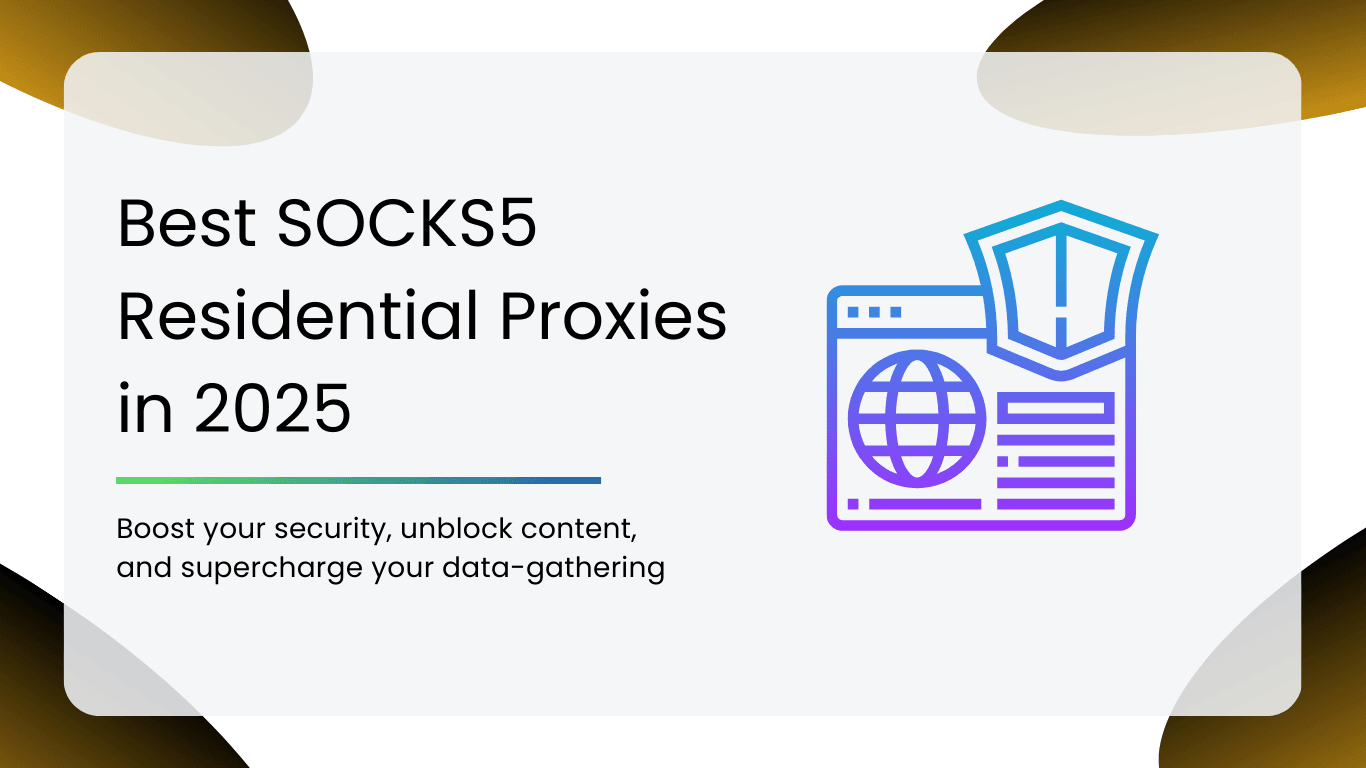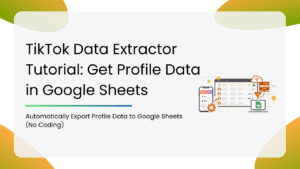As online privacy, data scraping, and geo-restricted content become bigger parts of our daily digital lives, having a reliable proxy isn’t just for techies anymore. In 2025, even small businesses, marketers, and casual users are turning to SOCKS5 residential proxies to stay anonymous, gather data, and keep their online activities secure.
If you’re ready to boost your security, unblock content, or supercharge your data-gathering, this article is for you. Let’s dive into the world of SOCKS5 residential proxies and see which ones lead the pack in 2025.
What is a SOCKS5 Residential Proxy?
SOCKS5 residential proxy routes your internet traffic through real, residential IP addresses instead of datacenter servers. SOCKS5 itself is the latest version of the SOCKS protocol. Unlike older protocols, it supports advanced authentication methods, UDP connections, and faster data transfers. This ensures better performance and stronger security.
Residential proxies, on the other hand, are IPs provided by actual Internet Service Providers (ISPs), not data centers. Combine the two and you get the best of both worlds, offering speed, stealth, and stability.
When you’re scraping product prices, managing multiple social media accounts, or trying to bypass geo-restricted content, a SOCKS5 residential proxy keeps your activities looking natural.
Why Choose SOCKS5 Over HTTP Proxies?
If you’ve been around proxies before, you’ve probably seen HTTP or HTTPS proxies everywhere. They’re fine for simple tasks like browsing or scraping small amounts of data. But when it comes to speed, security, and versatility, SOCKS5 leaves them behind.
Here’s why, in 2025, more people are making the switch:
1. Better Security & Higher Anonymity
HTTP proxies interpret and modify your web traffic at the application level, which can leave traces or even expose data. In contrast, SOCKS5 proxies don’t touch your traffic; they simply pass it through. This approach keeps your data more secure and your identity better protected.
2. Faster Speeds at the Transport Layer
Because SOCKS5 works at the transport layer (lower than HTTP), it moves data more efficiently. There is less lag, smoother performance, and faster connections, especially critical for tasks like streaming, scraping, or running multiple accounts.
3. More Compatibility with Diverse Protocols
HTTP proxies are built for web traffic only. SOCKS5 supports a wide range of protocols, including P2P applications, streaming services, and automation tools. Whether you’re doing ad verification or high-volume scraping, SOCKS5 can handle it effortlessly.
Factors to Consider When Choosing a SOCKS5 Residential Proxy
Here are the key factors to keep in mind to make sure you’re getting the best investment for your money:
1. IP Pool Size
More IPs means less chance of bans. A large, diverse IP pool means your requests look like they’re coming from real users all over the world. This is especially important for web scraping, ad verification, and multi-account management.
2. Speed & Stability
If you’re scraping massive datasets, streaming content, or even gaming, slow or unstable proxies can mess with your workflow. Look for providers that emphasize low latency, high uptime, and consistent speeds.
3. Geo-Targeting Options
Need access to a website as if you’re in New York, Berlin, or Tokyo? Advanced geo-targeting lets you filter IPs by country, region, or even city, giving you maximum control over your online presence.
4. Pricing & Flexibility
Some providers offer pay-as-you-go plans, perfect for small projects or occasional use. Others work on a monthly subscription for heavy users. Pick what suits your usage patterns.
5. Customer Support & Reliability
Even the best proxies run into issues. Reliable 24/7 customer support can be the difference between a five-minute fix and a full day of downtime. Check reviews and response times before committing.
Comparison of Best SOCKS5 Residential Proxies in 2025
| Provider | Speed & Stability | Standout Feature | Cons |
| Decodo | Very fast & reliable | Beginner-friendly dashboard, strong automation support | Limited free trial |
| IPRoyal | Solid performance | Very affordable | Smaller pool vs competitors |
| Rayobyte | Enterprise-grade speed | Known for 99.99% uptime | Slightly higher pricing tier |
| Proxy-Cheap | Decent stability | Budget-friendly with good global spread | Less hand-holding support |
| SOAX | Excellent speed and rotation | Clean IPs, granular targeting options | Pricier than most competitors |
| Oxylabs | Top-tier enterprise | Industry leader in compliance & scale | Expensive for small users |
| DataImpulse | Stable for scraping | AI-assisted proxy rotation engine | Fewer advanced filters than others |
| ProxyEmpire | Consistent speeds | Lifetime bandwidth rollover on plans | Not many niche features |
Best SOCKS5 Residential Proxies in 2025
| Table of Contents |
| 1. Decodo |
| 2. IPRoyal |
| 3. Rayobyte |
| 4. Proxy-Cheap |
| 5. SOAX |
| 6. Oxylabs |
| 7. DataImpulse |
| 8. ProxyEmpire |
1. Decodo
Decodo is known for its huge residential IP pool and competitive pricing, becoming a go-to for marketers, researchers, and businesses looking to automate, scrape, and stay anonymous online. In 2025, Decodo continues to stand out with its SOCKS5 support, clean dashboard, and powerful geo-targeting tools.

Key Features:
- Massive Residential IP Pool: Millions of IPs across 190+ locations, minimizing bans and blocks.
- SOCKS5 Support: Enhanced protocol support for faster, more secure connections.
- Advanced Geo-Targeting: You can filter by country, region, or even city, giving you pinpoint access to location-restricted content and market research data worldwide.
- Easy-to-Use Dashboard: Its clean interface and intuitive design mean you don’t need technical expertise to start managing and rotating proxies immediately.
- Flexible Pricing: Decodo offers both pay-as-you-go and monthly subscription plans, making it accessible for small businesses and enterprise-level operations.
Cons:
- Limited Free Trial: While there’s a refund period, you’ll need to commit to a paid plan to fully test performance at scale.
- Bandwidth Caps on Lower Plans: Entry-level tiers have bandwidth limits that might throttle heavy scraping or streaming projects.
Review: Decodo is a solid all-rounder. Its SOCKS5 residential proxies deliver strong anonymity, high speeds, and plenty of location options. For users looking for a balance of performance and price, plus a clean user experience, Decodo is one of the best choices for 2025.
2. IPRoyal
IPRoyal has carved out a strong place in the residential proxy world by offering a large, ethically-sourced pool of IPs, flexible plans, and SOCKS5 support. In 2025, it’s especially appealing to anyone who wants solid proxy performance without blowing their budget.

Key Features:
- Huge IP Pool & Geo-Coverage: Over 32 million residential IPs across 195+ countries, with state and city filters. This gives you flexibility in targeting specific regions and makes IP bans less likely.
- SOCKS5 & Protocol Choice: Supports HTTP/S and SOCKS5, plus both rotating and sticky sessions for up to 7 days.
- Flexible Pricing & No Contracts: Pay-as-you-go options mean you’re not locked in, and traffic you pay for doesn’t expire.
- Unlimited Simultaneous Sessions: You can run many concurrent connections without being artificially limited, which is useful for scraping, automation tasks, and scaling.
- Good Customer Support: It has a generally responsive support, with an intuitive user interface, real-time stats, manual or API-driven IP changes.
Cons:
- No Free Trial: While there are low-cost testing options, there is generally no completely free trial.
- Limited Advanced Features for Power Users: While it’s strong overall, some competitor services offer more specialized tools that IPRpyal doesn’t always match.
Review: IPRoyal offers a compelling mix of scale, flexibility, and cost-effectiveness in 2025. If your tasks involve scraping, regional data collection, ad verification, or managing multiple accounts, its large pool, SOCKS5 support, sticky sessions, and permissive session policies make it a strong value.
3. Rayobyte
Rayobyte is a versatile proxy provider offering residential, ISP, data-center, and mobile proxies. In 2025, it’s especially attractive for users who need strong geographic coverage, multiple proxy types, and reliable performance. For those who want more than one tool in their proxy belt, Rayobyte often shows up in comparison reviews as a solid choice.
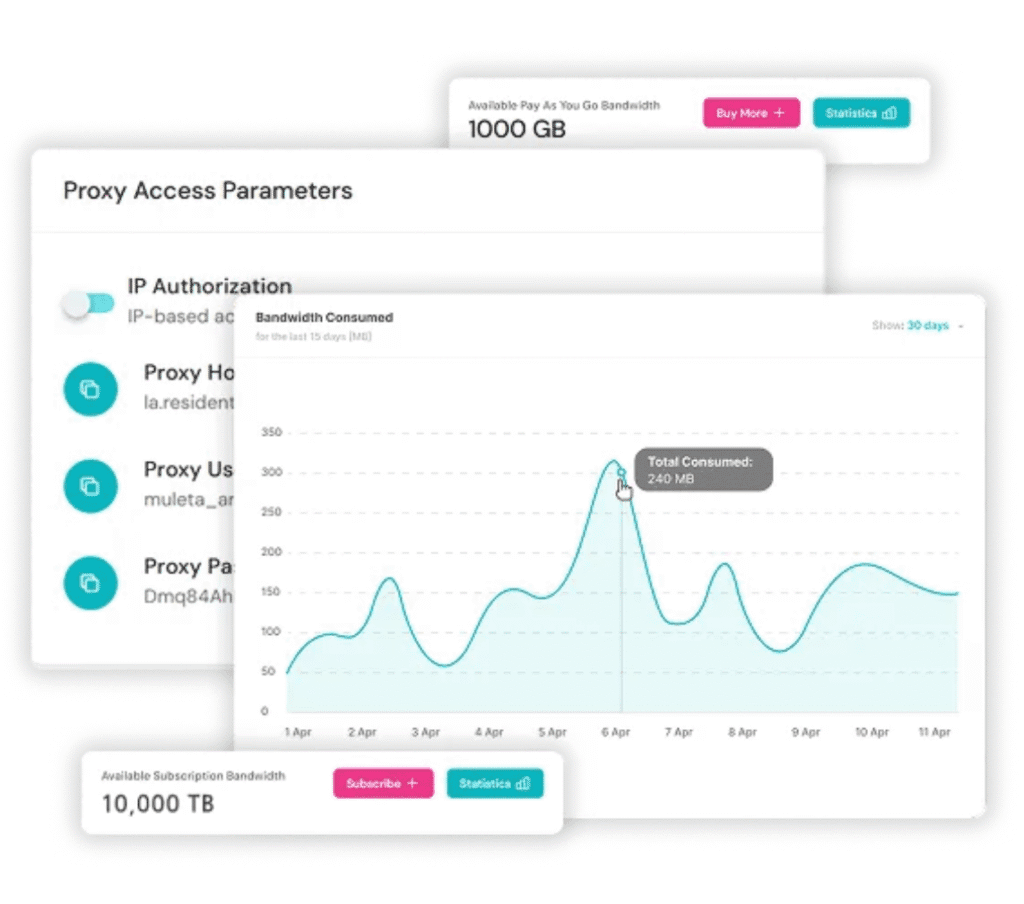
Key Features:
- Large, Diverse IP Pool & Global Locations: Rayobyte offers millions of residential IPs spanning 100+ countries, which helps reduce detection risk.
- Multiple Proxy Type: It is not just limited to residential, which means you can trade off speed vs stealth depending on the task.
- SOCKS5 Support: Though in a limited capacity, Rayobyte does support SOCKS5. However, if you need full SOCKS5 functionality, check the specific plan’s details.
- Ethically-Sourced Residential IPs: It offers residential IPs sourced with consent, under ethical terms.
- Good Speed: For most scraping, SEO monitoring, and social-media tasks, Rayobyte tends to deliver decent performance.
Cons:
- Plan Limitations for SOCKS5: The full SOCKS5 feature set may not be available in all plans.
- Regional/Availability Variability: Some locations or countries have fewer available IPs or slower performance.
Review: Rayobyte is a strong contender for 2025 if you need flexibility, geographic reach, and a mix of proxy types. If your priority is stealth (residential) combined with SOCKS5, and you don’t mind paying a premium, Rayobyte delivers well. The ethical sourcing of IPs, stable uptime, and good support are big pluses.
4. Proxy-Cheap
Proxy-Cheap promises budget-friendly SOCKS5 proxy services with flexible thread support and global location options. For users in 2025 needing affordable access without big commitments, it looks like one of the low-cost players worth checking out.

Key Features:
- Low Entry Price for Residential SOCKS5: The prices are very competitive for those who don’t need premium speed or ultra-reliable uptime.
- Unlimited Threads: Each plan includes unlimited threads, meaning you aren’t constrained by connection count.
- Variety of Proxy Types & Locations: Proxy-Cheap is perfect if you want to test different proxies/setups.
- Transparent Pricing Display: The site shows pricing per proxy, discounts for some plans, which helps estimate costs beforehand.
Cons:
- Mixed Performance: Performance can be inconsistent depending on location or use case.
- Hidden or Additional Costs: While the base price is low, when you factor in replacements, downtime, or needing many proxies, the effective cost rises.
Review: If you’re on a tight budget and need SOCKS5 residential proxies for light tasks, Proxy-Cheap might get the job done. It offers many proxy types and global options at very accessible pricing, which is its strongest selling point.
5. SOAX
SOAX has quickly scaled up to offer one of the largest ethically sourced residential IP networks. In 2025, SOAX is especially appealing for users who want flexible, high-quality SOCKS5 residential proxies with lots of geo-targeting, solid performance, and modern protocol support.
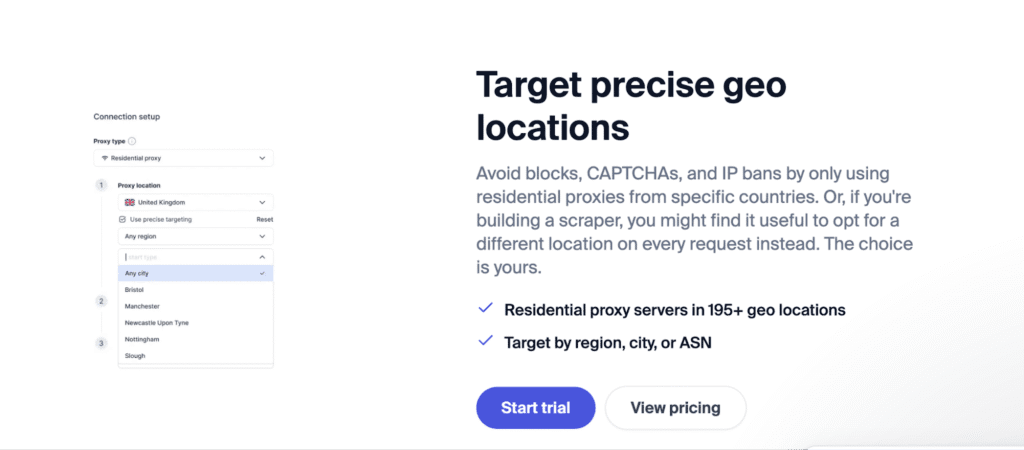
Key Features:
- Huge Geo Coverage: SOAX offers 155+ million residential IPs spread across 195 countries.
- SOCKS5 Protocol Flexibility: Supports HTTP, HTTPS, and SOCKS5 protocols; residential and mobile plans also allow UDP support.
- Sticky Sessions & Rotating Options: You can choose between IP rotation or sticky sessions.
- User Interface: You get a clean dashboard, lots of targeting filters, 24/7 live chat and email support.
- Ethical Sourcing: IPs are user-consented, whitelisted, and ethically sourced, reducing the risk of being on shady networks.
Cons:
- Performance Can Vary: In certain locations or when targeting less common cities, latency or speed may drop, or proxy reliability worsens.
- No Big Free Tier: SOAX’s pricing is structured for committed users. Smaller use cases can feel overpriced per GB.
Review: If you need reliable, high-quality SOCKS5 residential proxies in 2025, SOAX is very much among the top choices. It offers a large, globally distributed IP pool, good filtering and routing options, flexible session models, and decent support. For any task where stealth and consistency matter, SOAX delivers.
6. Oxylabs
Oxylabs is one of the big names when you need premium, large-scale residential proxy services. Its offerings include residential SOCKS5 proxies with global reach, high stability, and robust support. If you have serious scraping, geo-testing, or data collection needs, Oxylabs tends to deliver.

Key Features:
- Unlimited Sessions: Their residential SOCKS5 proxies let you send traffic using the SOCKS5 protocol, and they allow unlimited concurrent sessions.
- Traffic-Intensive: These proxies are built for heavy usage, with high uptime, and a system designed to scale up.
- Strong Geo-Targeting: You can filter by many criteria, meaning you can mimic being in very specific locations.
- Reliable Support: Their transparency, security compliance, and reliability make them a less risky choice for large projects.
- Multiple Pricing Tiers: Oxylabs offers pay-as-you-go and monthly subscription-style plans.
Cons:
- Complexity for Smaller Jobs: Because the system is made for large, traffic-heavy tasks, there can be more setup overhead.
- Features Sometimes Restricted: Full SOCKS5 with UDP or certain entry/outlet node features may be limited.
Review: The combination of a massive IP pool, strong geo-options, and high uptime makes it worth considering. Before committing, test with a small plan, check whether the SOCKS5 + UDP features you need are fully supported for your target locations. Be assured, Oxylabs is a top choice in 2025 if you need genuinely reliable residential SOCKS5 proxies for serious work.
7. DataImpulse
DataImpulse is one of the up-and-coming providers in the proxy space, especially notable for offering low-cost residential proxies with SOCKS5 support. It aims to provide flexible, pay-per-traffic proxy solutions that are accessible even for smaller users. In 2025, it stands out especially for its pricing, location variety, and protocol flexibility.
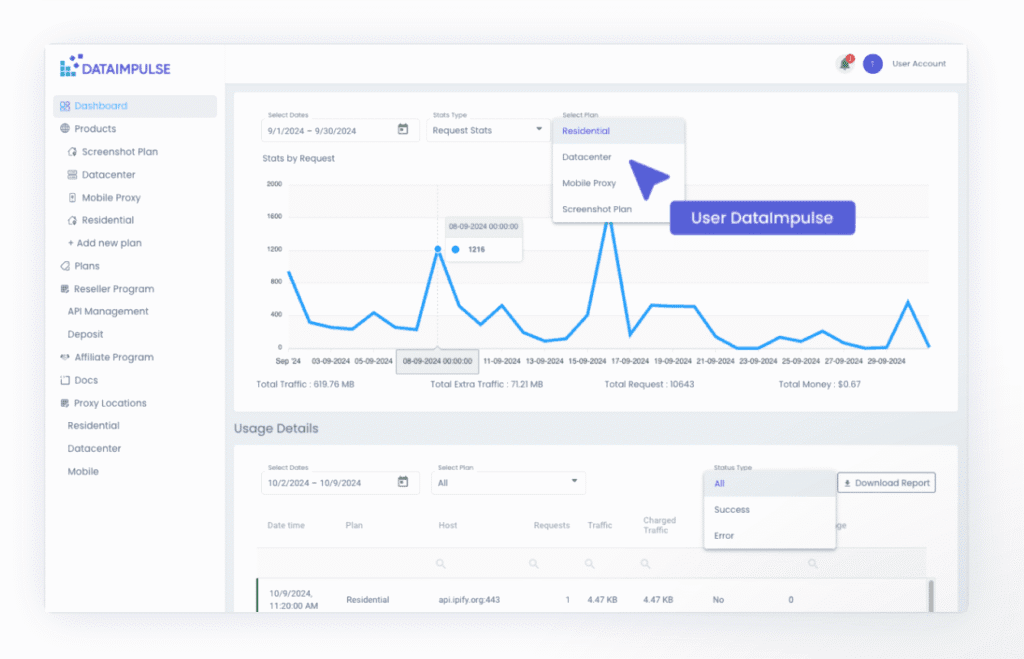
Key Features:
- Affordable Pricing: You can pay-per-GB, which is among the most budget-friendly in the market for SOCKS5 proxies.
- Support for SOCKS5: All residential plans support SOCKS5 protocols. You can use rotating IPs or sticky sessions, which is useful depending on your use case.
- Wide Geo-Targeting: DataImpulse gives you good geographic options. You can choose by country, city, ZIP, ASN.
- Large IP Pool: They advertise 90 million+ unique residential IPs across 195 locations.
- Useful Dashboard: Their UI includes tracking of proxy usage, how many proxies are available in each location, real-time metrics, etc.
Cons:
- Additional Costs: Using fine-grained filters tends to increase cost, sometimes significantly.
- Performance Varies By Region: As with many residential proxy providers, speed and connection reliability depends a lot on the location of the target site vs the proxy location.
Review: DataImpulse is a very competitive option in 2025 if you want cheap, flexible residential SOCKS5 proxies without major upfront costs. For many use cases like scraping, monitoring, geo-testing, working across many locations, etc., its features, geo-coverage and protocol support make it a top pick among budget-conscious users.
8. ProxyEmpire
ProxyEmpire is a mid-to-premium residential proxy provider that has been getting a lot of praise lately. It offers rotating and static residential proxies, mobile proxies, datacentre options, and pretty flexible protocol support. If you want strong geo-coverage, good uptime, and built-in tools, ProxyEmpire is worth a look.
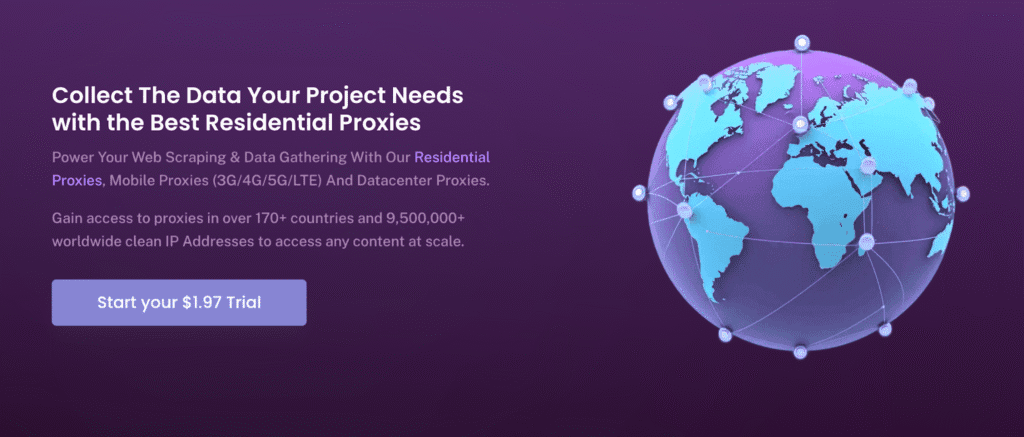
Key Features:
- Global Residential IP Pool: Proxy Empire offers 9-10 million residential IPs across 170+ countries.
- Protocol Support: Rotating residential/mobile proxies support HTTP, SOCKS5, and UDP; static residential and dedicated mobile also support HTTP/SOCKS5.
- Flexible Targeting Options: Users can choose between rotated IPs or sticky sessions, filter by ISP, city, etc.
- Rollover Bandwidth: Unused data from one billing cycle can be carried over, which helps avoid wastage when you don’t fully use your allotment.
- High Uptime: ProxyEmpire has an uptime of 99% for its rotating residential proxies.
Cons:
- Higher Cost for Small Usage: For small bandwidth users, the per-GB price is high.
- Performance May Vary By Region: In less common countries or remote locations, there are fewer IPs available, which can lead to higher latency, slower connections, or more blocks.
Review: ProxyEmpire strikes a compelling balance between features and performance. It is definitely among the upper tier of SOCKS5 residential providers in 2025. It’s not for everyone, but if you need what it offers, paying the premium often earns you fewer headaches.
SOCKS5 residential proxies are a powerhouse in 2025. Choosing the right provider (large IP pools, high speeds, strong geo-targeting, reliable support) and pairing with SOCKS5 is now the winning strategy. If you’re serious about privacy, automation, or large-scale data work in 2025, treat SOCKS5 residential proxies as the foundation, then build your stealth stack on top of it.
Explore more AI insights on Smacient:
- Top AI Tools For Startups in 2025
- Best AI Tools to Turn Blog Content to Videos
- Best AI Calendar Assistant/Scheduling Tools in 2025
FAQs
Most reputable SOCKS5 residential proxy providers operate legally and comply with data privacy laws. However, how you use proxies matters. Always review the provider’s acceptable use policy and your local regulations.
– Residential Proxies: Assigned by ISPs, appear as real users; great for high anonymity and low ban rates.
– Mobile Proxies: Use mobile carriers’ IPs (4G/5G); excellent for location testing and social media, but more expensive.
– Datacenter Proxies: Generated by cloud servers; cheaper and faster, but more easily flagged by websites.
– Scraping: Oxylabs, Decodo, SOAX
– Ad Verification: Decodo, Rayobyte
– Sneaker Bots: ProxyEmpire, Oxylabs
– Streaming: SOAX, Decodo
Integration is straightforward:
– Scrapers: Tools like Python scripts, Scrapy or Octoparse can be configured to use SOCKS5 with authentication.
– Browsers: Firefox, Chrome, or anti-detect browsers like Multilogin or GoLogin support SOCKS5 settings in-network or via extensions.
– Bots/Automation Tools: Most automation frameworks accept SOCKS5 as a standard proxy protocol, often with username/password authentication.
Disclosure – This post contains some sponsored links and some affiliate links, and we may earn a commission when you click on the links at no additional cost to you.

